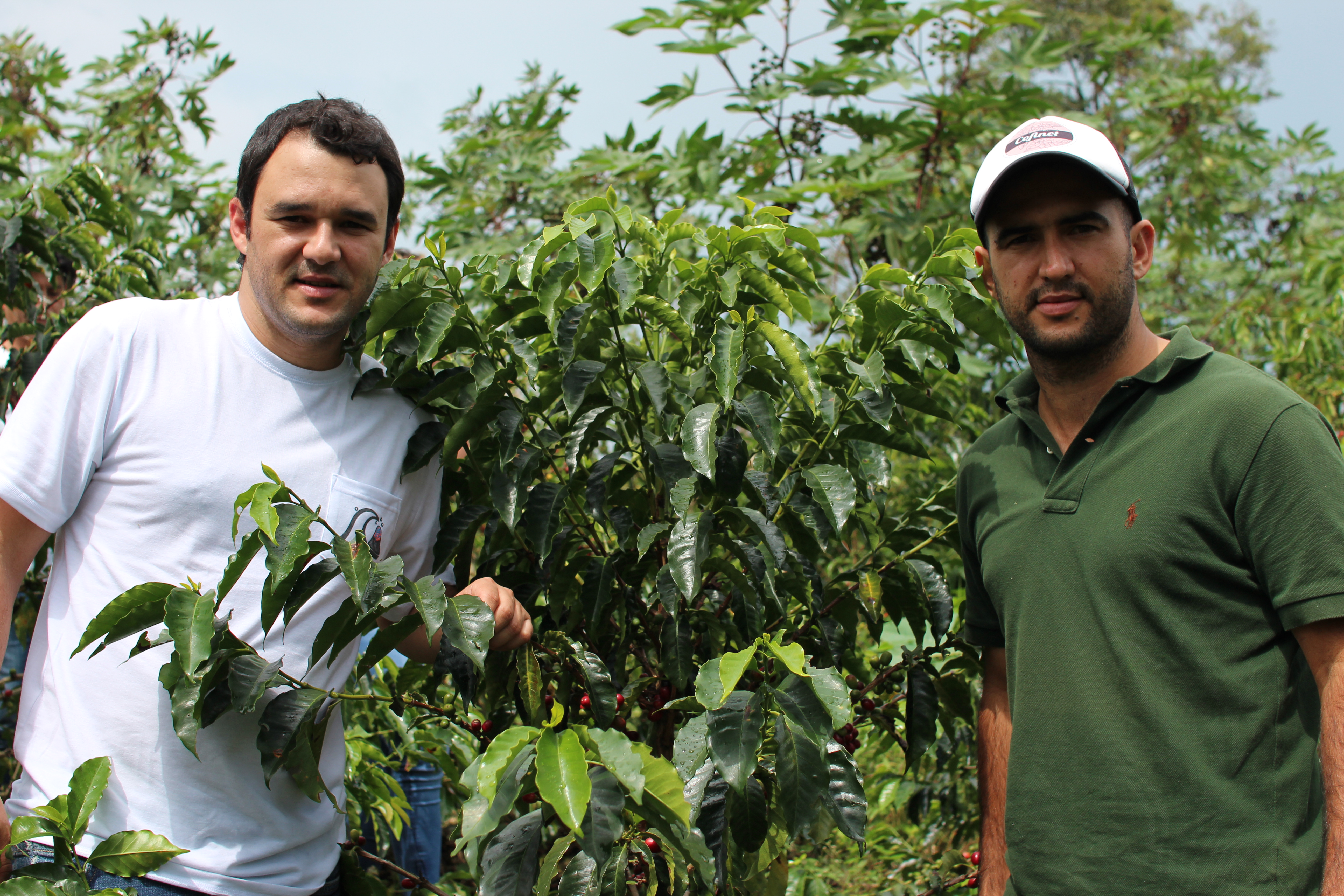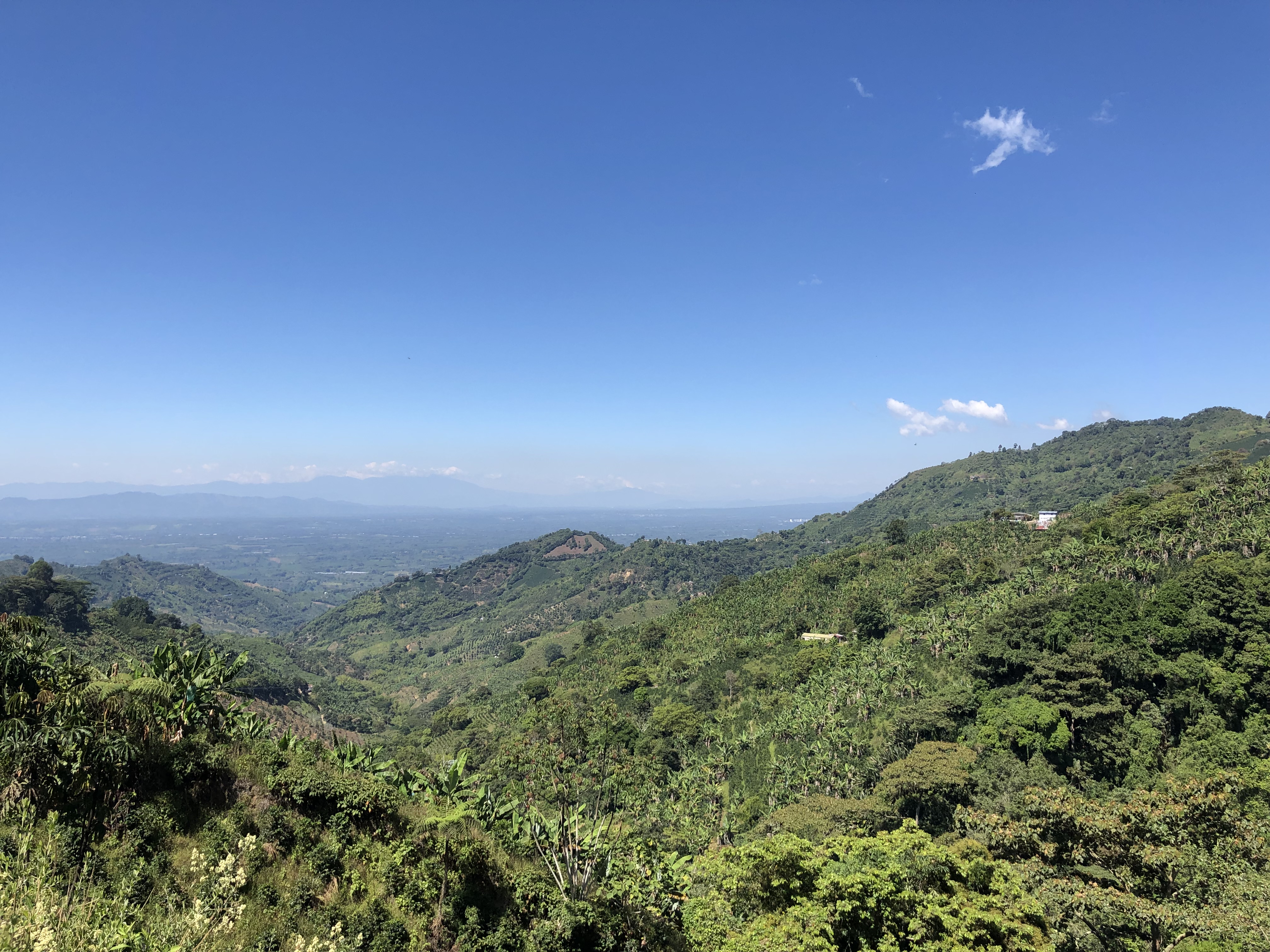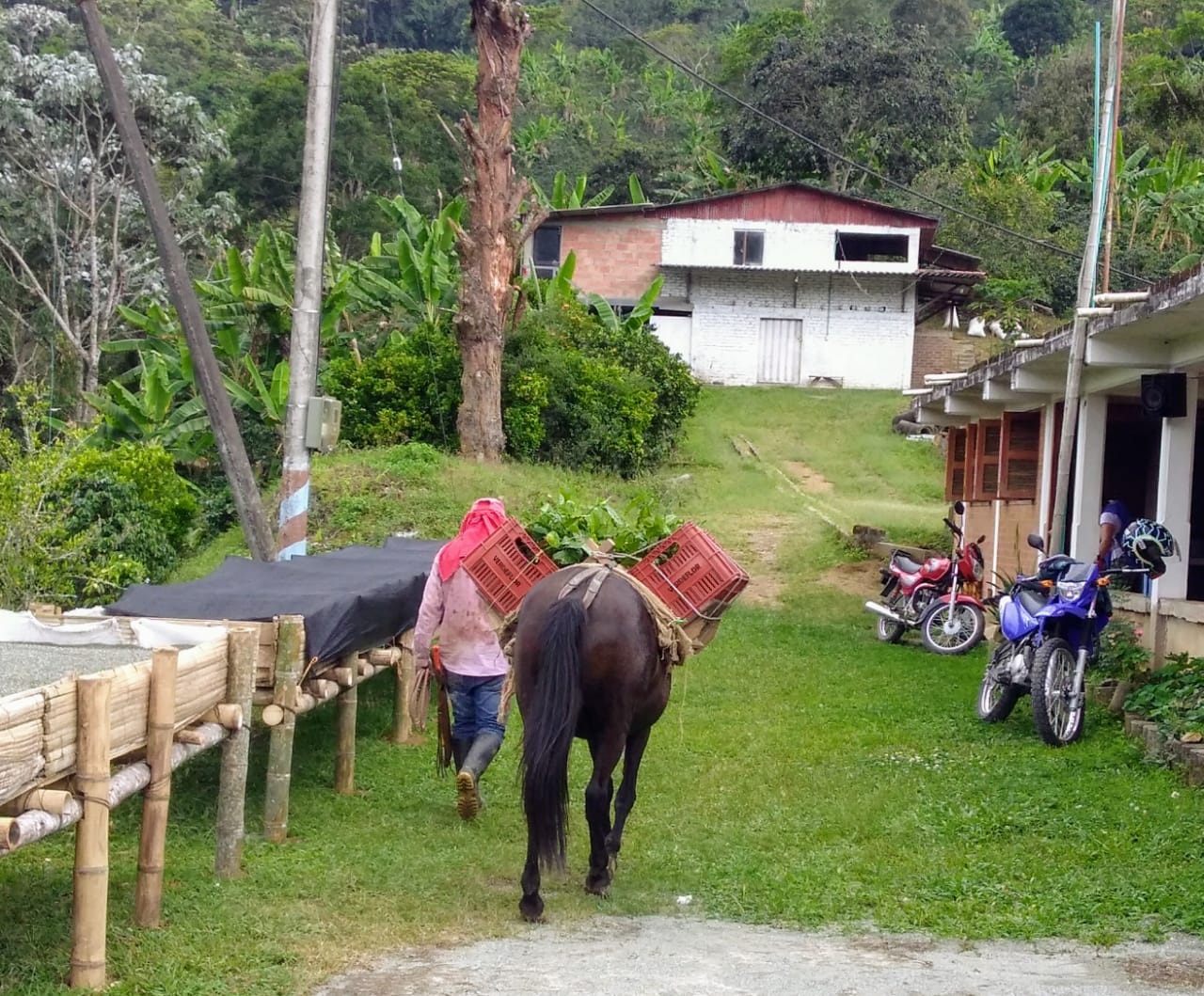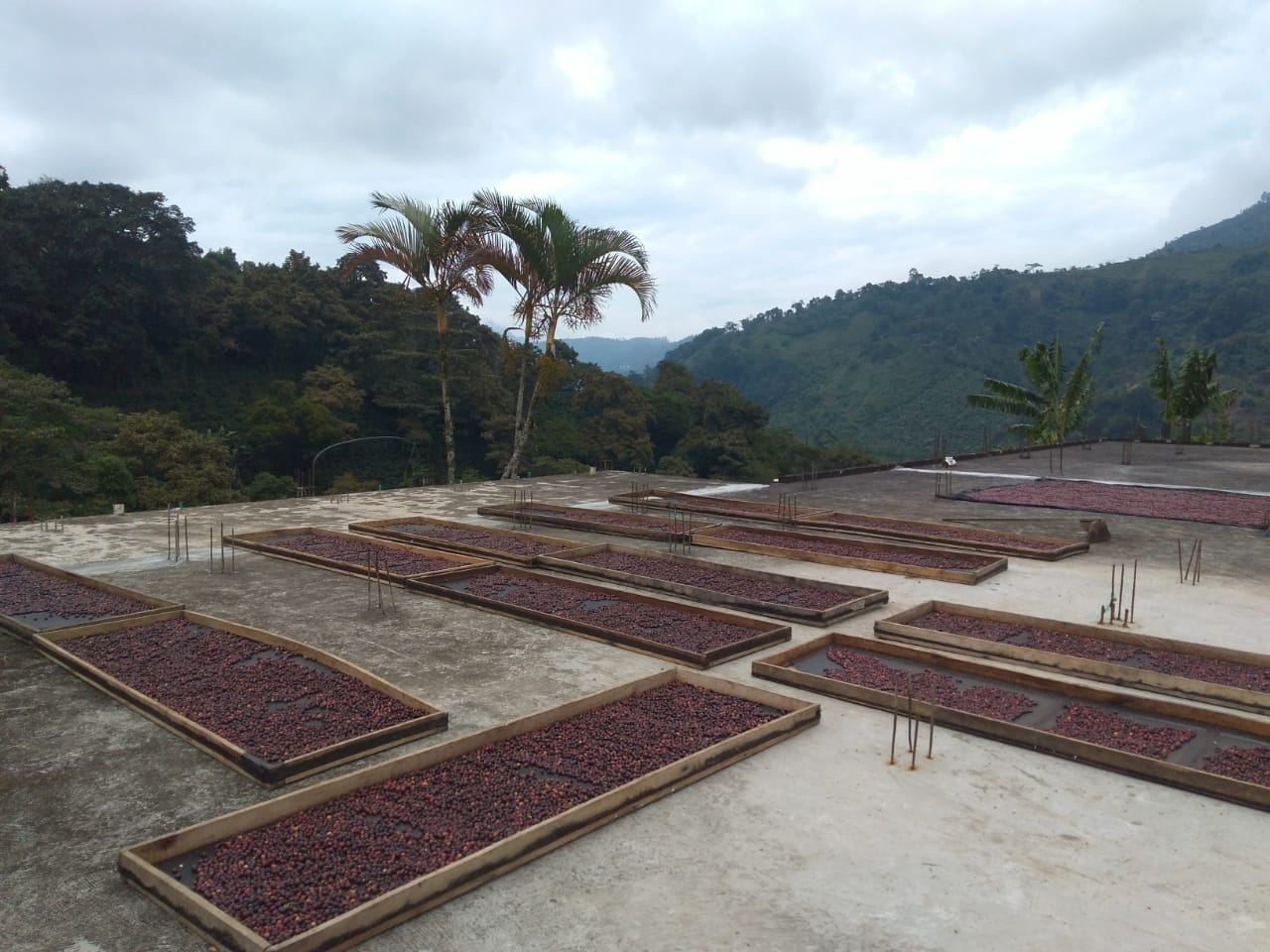-
Producer
-
Felipe Arcila
-
Country
- Colombia
-
Region
-
Quindio
-
Altitude
-
1700-1900m above sea level
-
Variety
-
Process
-
Importer
-
coronet
-
Body
-
Light
-
Acidity
-
Balanced
-
Tasting notes
-
Orange blossom, lemongrass, passion fruit
-
Roast style
Colombia
Jardines Del Eden
This VS coffee has grown in a piece of terrestrial paradise: a farm called Jardines del Eden (Gardens of Eden), right in the central mountain ranges of Colombia. It’s the first estate purchased by Cofinet, an Australian-Colombian coffee importing (and now also producing) company.
This VS coffee has grown in a piece of terrestrial paradise: a farm called Jardines del Eden (Gardens of Eden), right in the central mountain ranges of Colombia.
VERY SPECIAL
This coffee comes from a farm owned and operated by Cofinet, an Australian-Colombian coffee importing company we’ve worked with for years. Growing their own coffee was always part of their plans—or dreams— and this way they get to have a complete experience throughout the whole coffee chain.

While Carlos Arcila (left) is the Australian connection to Cofinet, his brother Felipe works on the ground in Colombia.
It’s is their first farm, but not the last (they already purchased a second one, Jardines del Encanto). They picked Jardines del Eden because of its phenomenal soil conditions, unusual cold microclimate (perfect for growing high-quality coffee) and unique biodiversity (plenty of native birds, one small waterfall and 3 water springs that feed their processing operations).

A view from the top of Jardines del Eden.
JdE serves almost like a lab where they can experiment and produce the coffee perhaps they don’t often access through the general market—and also helps them understand the pains and limitations faced by farmers. Here, they planted 14 of the best coffee tree varietals, from which only 8 are currently producing full yield; they expect the rest to start delivering by the end of 2022.
This coffee is part of a 100% Yellow Gesha microlot produced during their second harvest season ever.
THE YELLOW GESHA VARIETAL
In 1931, the British Ambassador of Ethiopia collected seeds near the village of Gesha to use for research purposes. From there, the coffee seeds journeyed to Kenya, Uganda, Tanzania, and finally to Panama, being recognized for tolerance to coffee leaf rust. However, the plant’s branches were brittle and not favoured by farmers so it was not widely planted.
The coffee came to prominence in 2005 when the Peterson family of Hacienda La Esmeralda (Boquete, Panama), entered it into the “Best of Panama” competition and auction. It received exceptionally high marks and broke the then-record for green coffee auction prices, selling for over $20/pound.
Gesha, also spelled Geisha, is associated with extremely high cup quality when the plants are managed well at high altitude, and is known for its delicate floral, jasmine, and peach-like aromas.
Yellow Gesha trees produce yellow coffee cherries, hence the name.
(Sources: World Coffee Research, Trabocca, SCA)
THE PROCESS
Christian, the farm manager, employs biodynamic principles for the growth and production of the coffee at Jardines del Eden—i.e. avoiding the use of fertilizers.
This particular microlot’s cherries were exposed to dry aerobic fermentation for 24 hours before being placed inside Grainpro bags for 50 hours at a temperature below 22℃. Then, the whole fruits were air-dried on raised beds until achieving an 11% moisture content.

One of Christian’s best workmates!

The dry beds.
BREW, SHARE AND ENJOY
Now you know a bit more about the background it’s time to enjoy this awesome coffee! If you don’t know where to start, you can use the team’s brewing recipe (see below on this page).
You can also try your favourite method (check our brew guides if you need assistance/inspiration) and play around with some settings to get the best of it.
Don’t forget to tell us how it went, perhaps adding your recipe here, via email or on Instagram at @samplecoffee. We look forward to hearing about your experience with this VS coffee!
Learn everything about this coffee:
Ethical, traceable sourcing
This page has all the sourcing information (variety, process, region, story, importer, and more) that our importers share with us, and give us permission to use.
The transparency helps us talk confidently about the quality and background of our product, and it helps you know exactly what you’re buying.
Learn more:
Coffee page transparency legend
Our coffee philosophy
Our business approach
Fresh harvest coffee
We only source and roast coffee from each country’s latest harvest season (so the green coffee is never older than 1 year from the time of picking, processing and packing). This ensures the sensory qualities are always at their peak and unaffected by excessive ageing.
Roasted for espresso and filter (best enjoyed black)
Roast style: omni. Omni roasts are designed to brew and taste great both as espresso and filter. Our omni single origins generally sit on Agtron values in the ~70-60 value range. So, technically, they are somewhere in the lighter side of the medium spectrum.
Designed for espresso and filter brewing. Best enjoyed black.
Learn more:
Our Loring Kestrel S35 roaster
Our roasting style and approach
Best brewed within days 15-49 post-roast
The ‘fresh is best’ saying doesn’t apply to coffee (contrary to popular belief). Waiting before opening and brewing your bag of whole coffee beans helps develop peak flavour and acidity.
But heads up: if you buy pre-ground coffee, brew it as soon as possible.
Learn more:
Our recommended brewing window
Try our custom brewing recipes
Our recipes and ratios are tailored to our coffee sourcing and roasting styles, bringing the best flavour and feel out of each coffee.
For pour over, immersion, and other filter brewing styles, check our brew guides.
For our espresso single origins, we recommend a coffee:yield ratio of 1:3:
- Dose: 20g ground coffee
- Yield: 60g espresso
- Total brew time: ~24-28 seconds
This is just a starting point! We encourage you to experiment, taste, and adjust to find the recipe that you enjoy the most.
Learn more:
Our espresso brew guide (single origin)
Brewing ratio calculator
Packaging and sustainability
- Bags: ABA-certified home compostable (AS 5810-2010)
- Labels: recyclable
- Valves (only on +250g bags): general waste
- Box and tape (online orders): recyclable
Learn more:
Our packaging
Variety
Yellow Gesha variety
The location
Coffee from Colombia
Colombia is one of the largest coffee producers in the world and benefits greatly from having one of the most unique and complex set of micro-climates of all coffee producing nations.
Farm processes
Natural process
This technique leaves some flesh on the coffee cherry during processing and drying. This results in flavours which may show jammy fruit and a little winey-ness.
1 brew note from subscribers
Colombia Jardines Del Eden
Reuben’s Kalita Wave
Sample Coffee Team
- 12g
- 200ml
- 2m 20s

Subscribe to a world of coffee
Discover a new single origin coffee from Sample every 1-5 weeks with no delivery fees.
No up-front purchase, and you can pause, cancel, or change plans at any time.
Available to order online this week:

Mexico Isavel Lopez Pablo
Flavours of sugarcane, dried cranberry, white peach
Body Acidity
Washed Typica
April 2025 harvest
Roasted omni for filter and espresso
Mexico Isavel Lopez Pablo online
Kenya Karimikui
Flavours of blood orange, blackberry, plum jam
Body Acidity
Washed Batian, SL28, SL34, Ruiru 11
November 2024 harvest
Roasted omni for filter and espresso
Kenya Karimikui online
Rwanda Kibirizi
Flavours of mandarin, raisin, apple
Body Acidity
Washed Bourbon
June 2025 harvest
Roasted omni for filter and espresso
Rwanda Kibirizi online
Ethiopia Tadese Teko
Flavours of bergamot, mandarin, mango
Body Acidity
Washed Ethiopian Heirloom
January 2025 harvest
Roasted omni for filter and espresso
Ethiopia Tadese Teko online